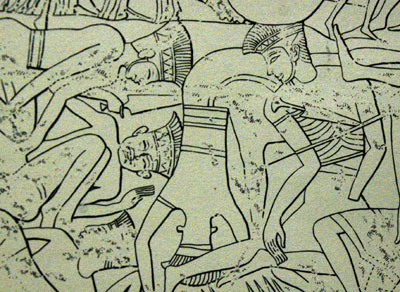
Even down to the Philistine style feather hats.

Posted on 05/13/2016 7:38:33 AM PDT by SunkenCiv
The Trojan War was a grander event than even Homer would have us believe. The famous conflict may have been one of the final acts in what one archaeologist has controversially dubbed "World War Zero" -- an event he claims brought the eastern Mediterranean Bronze Age world crashing down 3200 years ago.
And the catalyst for the war? A mysterious and arguably powerful civilisation almost entirely overlooked by archaeologists: the Luwians.
By the second millennium BC, civilisation had taken hold throughout the eastern Mediterranean. The Egyptian New Kingdom coexisted with the Hittites of central Anatolia and the Mycenaeans of mainland Greece, among others.
In little more than a single generation, they had all collapsed. Was the culprit climate change? Some sort of earthquake storm? Social unrest? Archaeologists can't seem to agree.
Eberhard Zangger, head of international non-profit, Luwian Studies, based in Zurich, Switzerland, says that's because one crucial piece of the puzzle is missing. Another powerful civilisation in western Anatolia played a crucial role in the downfall (see video below)...
So what do other archaeologists make of this idea of a lost Luwian civilisation? Many stopped trying to impose this sort of monolithic cultural identity on ancient peoples decades ago, says Christoph Bachhuber at the University of Oxford.
"Archaeologists will need to discover similar examples of monumental art and architecture across western Anatolia and ideally texts from the same sites to support Zangger's claim of a civilisation," he says.
The textual evidence available is mainly from post-Bronze age and it paints a slightly confusing picture, which could be seen as both supporting and undermining Zangger's theory, says Ilya Yakubovich, a historical linguist at the Philipp University of Marburg, Germany.
(Excerpt) Read more at newscientist.com ...
Dead languages ||| Anatolia / Languages
Luwian language
Also called: Luvian; Luish
http://i-cias.com/e.o/luwian_l.htm
https://www.reading.ac.uk/web/MultimediaFiles/luwian.jpg
Detail of Stele of Sultanhan. Museum of Anatolian Civilizations, Ankara, Turkey.
Extinct Indo-European language spoken by the Luwians, an ancient people of southern Anatolia. It was spoken from before 2000, lasting until 200 BCE.
Luwian is closely related to Hittite, Palaic and Lydian. It is the ancestor, or close to the ancestor, of Lycian. Some theories make Luwian the language of the people of Troy. After the fall of the Hittite Empire, Luwian was spoken in some of the city states emerging after the fall of the Hittite Empire, like Milid and Carchemish.
Our main sources are from cuneiform tablets found in the Hittite archives at Hattusha. Luwian was also written with a form of hieroglyphs beginning in the 18th century and would last until the 8th century BCE. Luwian hieroglyphs are not believed to be derived from the Egyptian counterpart, having a structure and appearance quite different.
There are differences in language between the cuneiform and hieroglyphic; cuneiform was in Central Luwian, hieroglyphic in Eastern Luwian.
At a later stage, from around 600-200 BCE, West Luwian emerged as the most important language, being written with an alphabet.
By Tore Kjeilen
Luwian
http://www.ancientscripts.com/luwian.html
Luwian Identities
Culture, Language and Religion Between Anatolia and the Aegean
Edited by Alice Mouton CNRS, Ian Rutherford Reading University, and Ilya Yakubovich Moscow State University
http://www.brill.com/luwian-identities
http://www.brill.com/sites/default/files/styles/large/public/ftp/images/products/295x295/49203.jpg?itok=PAG-lytP
http://booksandjournals.brillonline.com/content/books/9789004253414
https://www.reading.ac.uk/classics/research/class-research-luwian.aspx
Kingdoms of Anatolia - Kizzuwatna
http://www.historyfiles.co.uk/KingListsMiddEast/AnatoliaKizzuwatna.htm
Theses For The Reconstruction Of Ancient History
From The End Of The Middle Kingdom In Egypt To The Advent Of Alexander The Great
By Immanuel Velikovsky [1945]
http://www.varchive.org/ce/theses.htm
(see #258 - 275)
The Sea Peoples are a modern invention, used to wave away problems created by blind acceptance of the conventional pseudochronology.
There are two references to them in Egyptian contemporary records, which are misdated by centuries anyway. There are otherwise no ancient references to them anywhere.
They left no characteristic pottery, no geographic traces, no towns, no tombs, no distinctive burials, no characteristic armor, no characteristic weapons, identifiable rulers (including conquerors of the lands they supposedly conquered) or king-lists, no written records in their own right, no coins, and perhaps most significantly, no wrecks -- the last one being pretty damned peculiar for a massive group of seagoing conquerors. :')

Even down to the Philistine style feather hats.

There are no “Philistine style feather hats” — the need to find someone, anyone, to play the role of “Sea Peoples” led those Persians to be called Philistines.
I should have pointed out that Zangger’s also equated the Trojan War with Plato’s story of Atlantis — this should get some blood circulating. ;’)
And no, Thera/Crete was *not* Atlantis — if Atlantis wasn’t exactly where Plato placed it — in the Atlantic Ocean (hence the name), it was entirely an invention for a couple of his dialogues. His is literally the only ancient source of the legend.
The Flood from Heaven: Deciphering the Atlantis Legend
by Eberhard Zangger
http://www.goodreads.com/book/show/1960683.The_Flood_from_Heaven
Oh.....Kayyyyyy
That is a gray area.
Helmet or headdress of Persian archer, from a bas-relief of Persepolis, B.C. 560. Cast is found in the British Museum.
http://www.bible-history.com/admin1/image/thumbs/Helmet-Or-Headdress-Of-Persian-Archer-From-Bas-Relief-Of-Persepolis-BC560.gif
They were a minor mode. /rimshot
> Most scholars doubt that the Dorian invasion was the main cause of the collapse of the Mycenean civilization.
https://en.wikipedia.org/wiki/Dorians#The_Dorian_invasion
The Etruscans were Luwians.

Processional Frieze, Persepolis

Just catching up. . .the placement of Atlantis is based on Plato saying that it was beyond the Pillars of Hercules, usually interpreted to mean beyond Gibraltar. However, there was another set of ancient “pillars” in the Aegean Sea, not far from Thera, also known as the Pillars of Hercules, so Atlantis could very well be Thera.
The Arabs, however, could be blamed for the Amorite invasion of Babylon and the Hyksos takeover of Egypt... but these were probably not the cause of the Bronze age collapse, which occurred later.
see Eric Cline's book 1177BC
There’s some writings from the period in Egypt that indicates that the Egyptians were trying socialism and it was going about as well as most socialist states.
I'd read that as well, in the 1970s. That second set of pillars is a modern invention. And Plato's description continues, making it quite clear of the location. Further, he gives its size, gives an age -- the only way to move Plato's Atlantis is to throw out his entire tale, which is the only source of the legend.
I agree, wholeheartedly, that entire milieu — Luwians/Lydians/Arzawans, Minoans, Carians, Lemnians, Etruscans — are at least cousins. There are Etruscan tomb interiors that look like they were cut in the bedrock of Crete.
Disclaimer: Opinions posted on Free Republic are those of the individual posters and do not necessarily represent the opinion of Free Republic or its management. All materials posted herein are protected by copyright law and the exemption for fair use of copyrighted works.